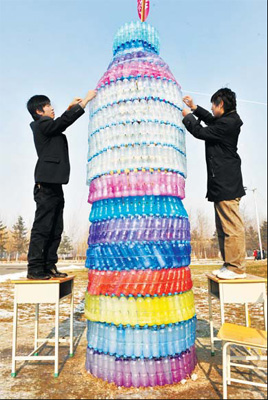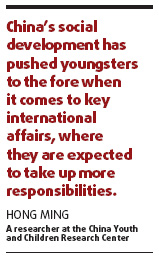Society
Young eco warriors in China
By Si Tingting (China Daily)
Updated: 2009-12-15 07:34
With the help of Chang, Zhao managed to raise enough funds to cover the 40-strong team's flight tickets as well as accommodation expenses.
Getting the funds for the team's travel to the world's second most expensive city was not an easy job - 250,000 yuan ($3,660) for each at the very least - given that there were only two months to accomplish it. Chang and her team, however, achieved the miracle.
 Two students from Shenyang Ligong University complete a structure made of 3,600 recycled plastic bottles in a bid to encourage people to protect the environment. It took them 15 days to complete the 4-m high and 1-m in diameter bottle. [Tian Weitao] |
"One of the reasons we were able to get international funding was because it was very rare that you have so many Chinese youth leaders meeting with US youth leaders. The international donors have been looking for US-China co-operation opportunity for so long," she said.
According to Chang, these international donors did not ask much in return for sponsorship. "The only requirement is to make sure there is interaction - no matter whether it's right or wrong," she said. "I think they have an intrinsic belief that significant co-operation between US and China is going to take place in the future though small conversations between interested parties on both sides now," she added.
In addition, UNFCCC required the team to do one video blog a day and to interact with youth in China, while WWF simply required some assistance in translating material.
Chang did, however, notice a lack of support from Chinese businesses. "It's just not part of their business culture, I think, especially when the time is limited and the summit is not in China," Chang said.
A few Chinese youth delegates reached out to raise funds on their own. One high-school girl lobbied her school to partially reimburse her tickets and accommodation and three other college girls from Chengdu, capital of Sichuan province, received funding from the local environment protection bureau.
By comparison, their US counterparts were not lucky enough to get professional fundraising assistance. Still, they managed to organize a delegation of up to 150 people through bake sales in their communities, fundraisers at local bars and pubs and their own savings.
Unlike the COP15 Chinese youth delegates who claimed to be the voice of youngsters in China, 24-year-old Xiao Xin said most of the Chinese youth who showed their concern for climate change had actually little idea about what it really was.

Xiao will also participate in the Copenhagen negotiation as the "I Do" envoy of the Hong Kong chapter of Oxfam, an international NGO that tries to find long-term solutions to poverty, hunger, and social injustice.
Xiao has met many Chinese youth climate activists, but she says few may have personally witnessed the heavy death toll brought about by weather calamities such as droughts, floods, hurricanes and tornadoes.
When she wrote her thesis on climate change two years ago, Xiao was bored reading facts and figures on climate change topics, but she was appalled to see how merciless and deadly these facts and figures mean in real life. She realized that when she visited China's far west, where ecological systems are most fragile.
"I spent almost all my winter and summer vacations in China's poorest places. And, that experience has given me a deeper understanding of the poverty brought about by changes in climate," said the 24-year-old graduate student of eco-socialism at Nankai University in Tianjin.
During the previous summer vacation, she went with Oxfam to a primitive village in Northwest China's Gansu province, where she met many poor villagers who had to walk two hours everyday to fetch drinking water from a muddy pond.
The local villagers could easily dig wells for water 20 years ago, but now, after ten years of constant drought, all the wells have gone dry, she said.
"Rain and snow are already childhood memories for senior citizens there," she said.
For urban dwellers, rain and snow mean a bit of fun or fuss. But for the villagers, they are lifelines.
"Because of the spring drought, the corn was only half its original size, and the ice storm in June reduced the already-bad yield to almost nothing," she said.
In Copenhagen, Xiao will be the voice of millions of poor Chinese farmers whose lives are the ones that are really threatened by climate change.
"It's so unfair that these poor people had near-zero emissions with their primitive way of living and few wants, but they are bearing the consequences for our emissions and they are not even aware how unfair it is," she said, adding that only one or two young people in the village had heard of "climate change" and knew nothing about the Copenhagen meeting.
Xiao will spread their stories to the world's climate policy-makers and try to persuade the rich nations to increase funding. "They don't need much. Only 100,000 yuan will work to bring water to an entire village," she said.
Compared with Zhao, Xiao seems to have a more clear-cut mission for the Copenhagen trip.
However, Zhao said he was satisfied with his first effort to take his team to the international climate negotiations since that will be a life-changing experience for them.
Zhao is now planning to initiate the second delegation to the meeting next year, and plans to take more people from backward villages.
"This time, our selection process required people to write a 10-page essay in English and that's a 'mission-impossible' for village students who do not have access to the Internet. But next time, we will reach out further, and try to give them this life-changing opportunity," he said.







